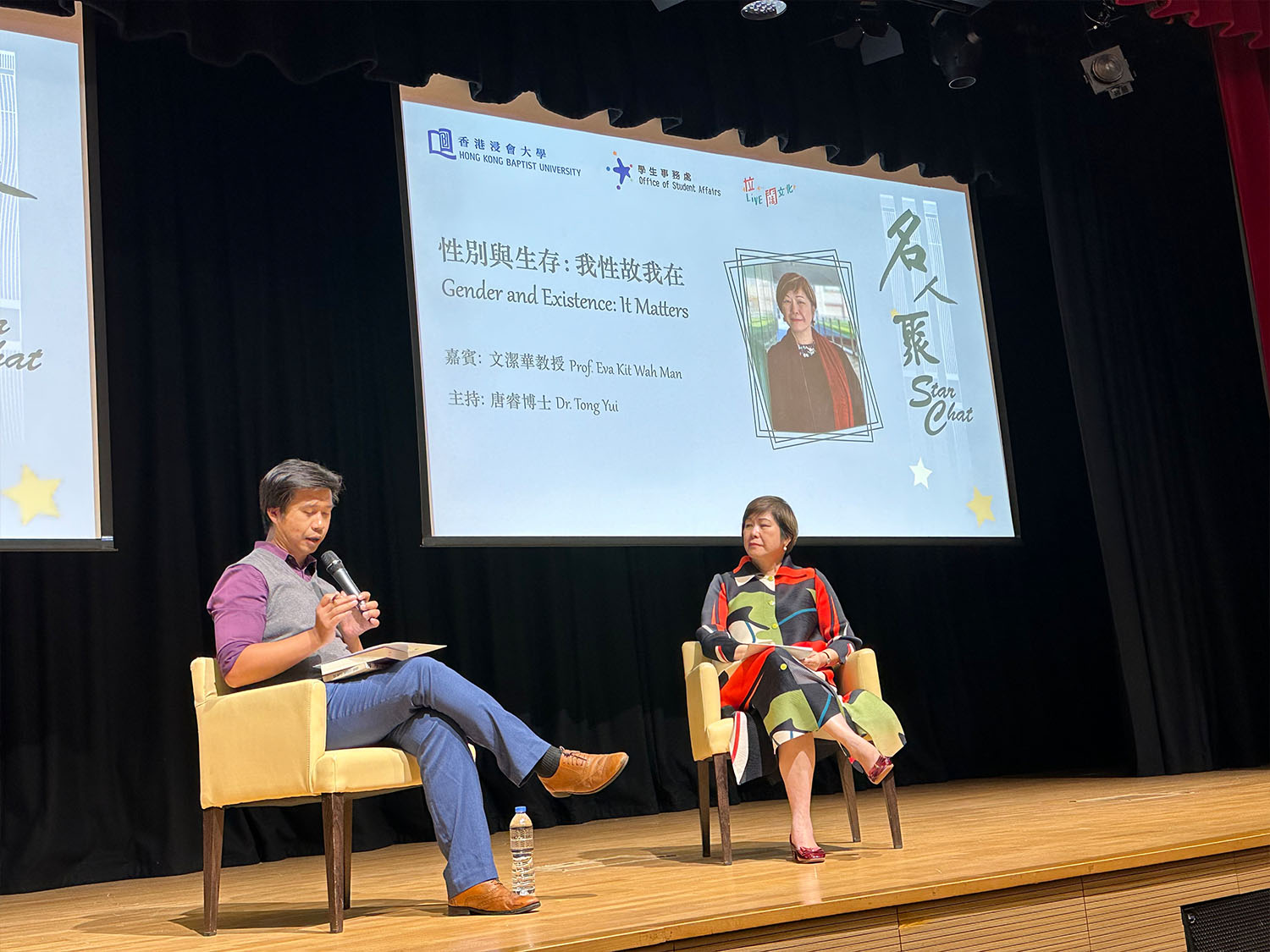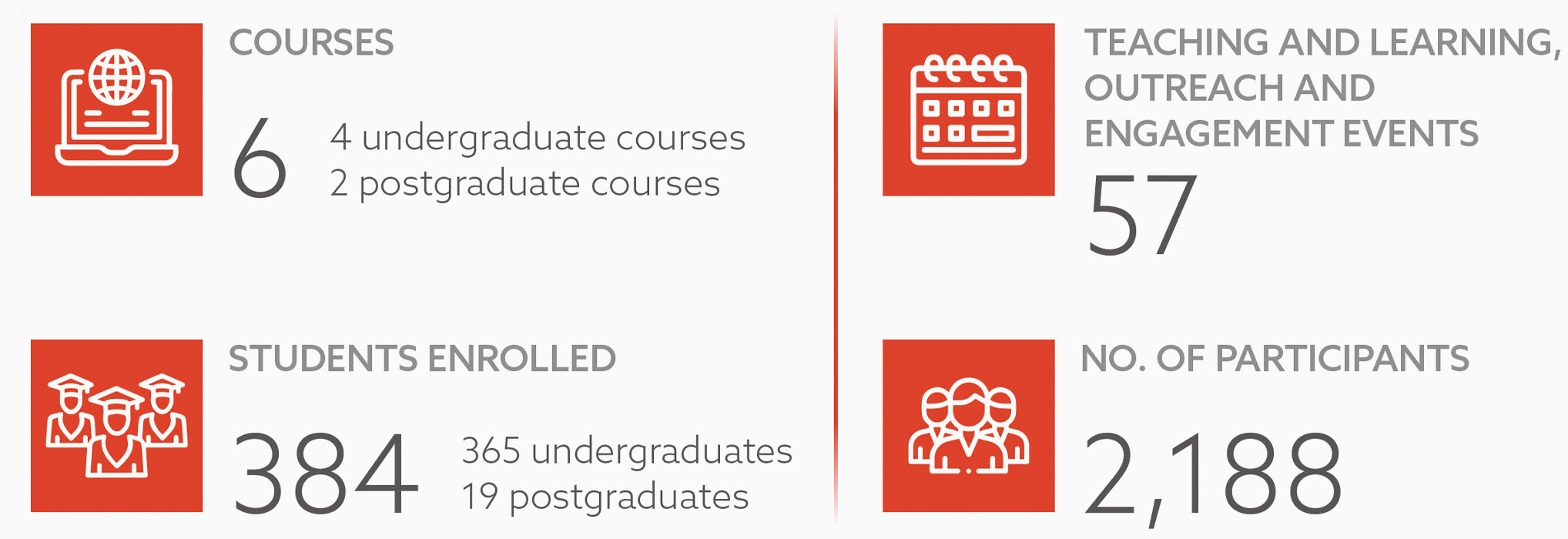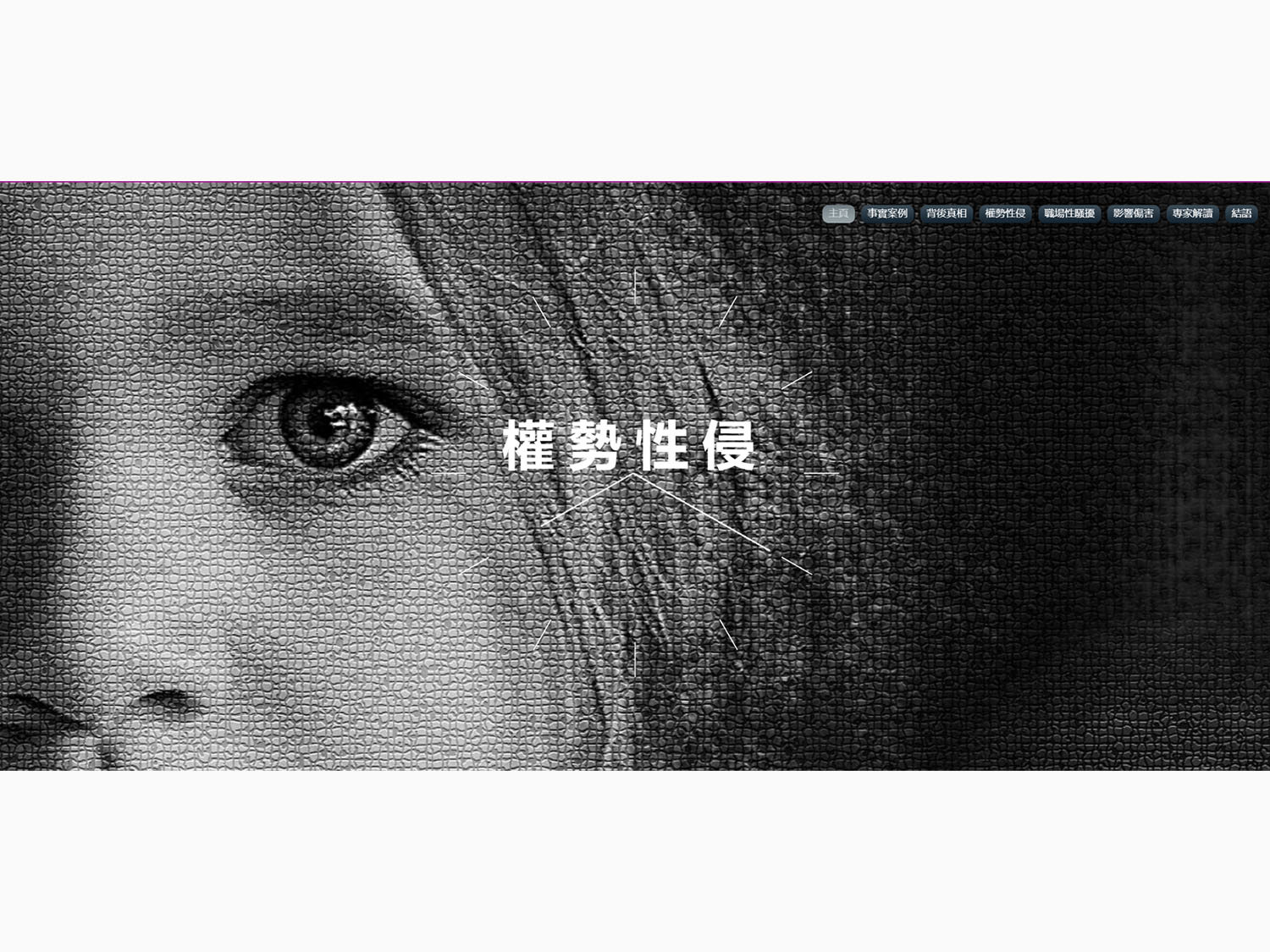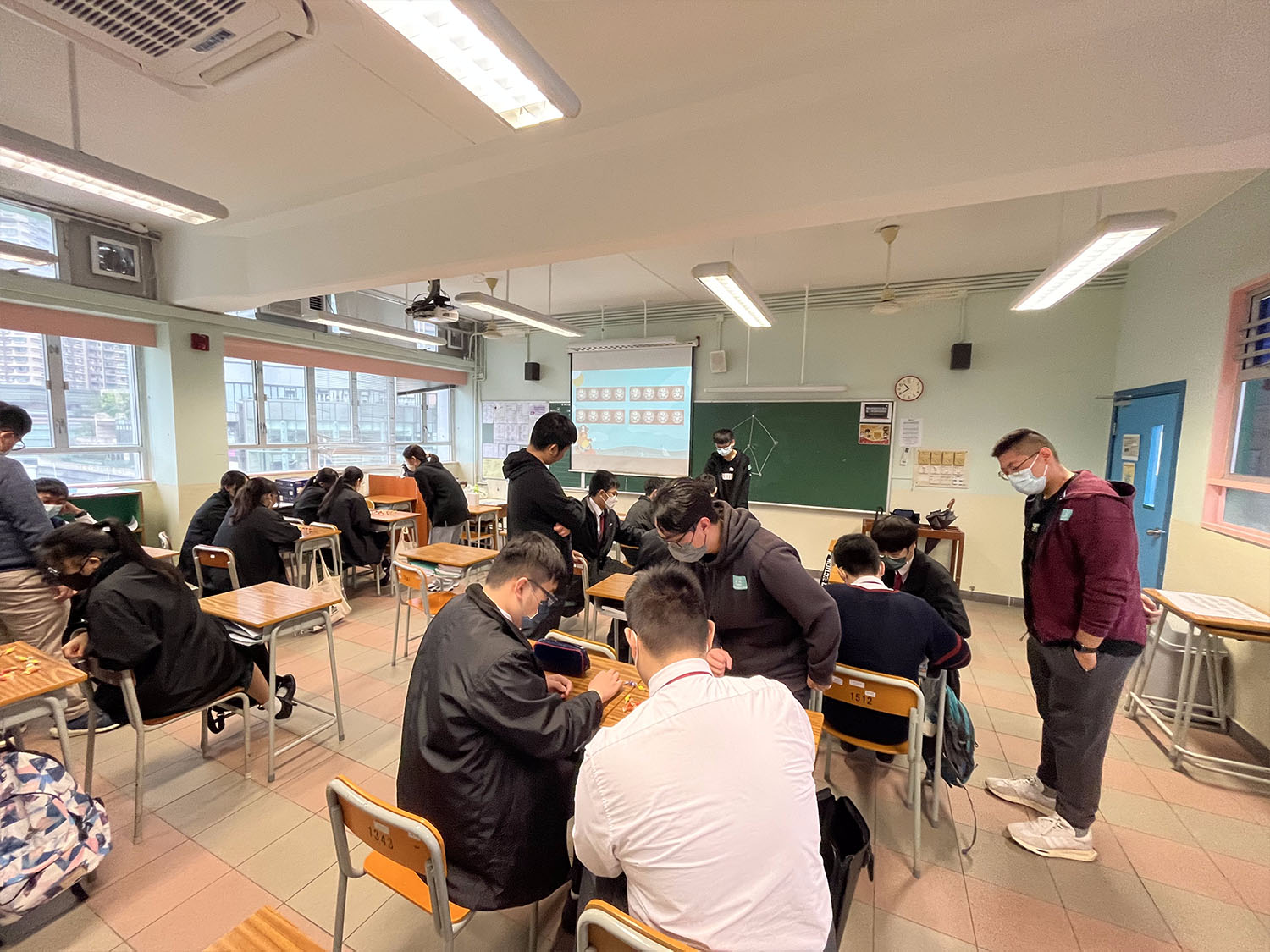SDG 05: Gender Equality
In the General Education capstone course "Data Storytelling for Gender Equality", taught by Dr Rose Luqiu, students acquired the knowledge and skills necessary to understand the influence of gender statistics on policy development. They learned how to analyse gender-related data and effectively transform analytical findings into compelling narratives. Collaborating with both local and international NGOs, students created multi-media stories and presentations that raised public and policymaker awareness of gender equality issues. These experiences empowered students to engage in critical reflection from multi-disciplinary perspectives on the importance of gender statistics and to advocate for sustainable initiatives for gender equality, thereby fostering a more inclusive and equitable society.
Exploring romance and equality through mathematical insights
The General Education capstone course "MathRomance", taught by Dr Sun Pak-kiu, guided students to explore the complexities of romantic relationships, including gender equality, from a mathematical perspective. The course featured guest lectures from experts in sexuality and gender, providing students with a framework to navigate the complexities of romance from an analytical perspective. By engaging with these dilemmas, students enhanced their ability to make value judgments and decision. As a community engagement activity, students organised workshops for secondary school students to demonstrate how to apply a scientific approach to analysing different romantic situations through interactive lectures. This hands-on experience not only increased the younger generation’s motivation to learn mathematics, but also encouraged them to integrate mathematical and logical thinking when addressing complex and sensitive issues related to gender, sexuality, and relationships.
Exploring femininity: A philosophical journey through gender and existence in Hong Kong
"Gender and Our Existence: It Matters", organised by the Cultural Literacy Programme of the Office of Student Affairs, sparked conversation and addressed the issue of gender construction and one's existence through personal experiences at different stages of life: childhood, adolescence, adulthood, middle age, and the ageing process. The talk explored what it means to live as a woman within the social context of Hong Kong. For the speaker, a follower of philosophy, femininity encompasses meanings that extend beyond social gender issues and relate to our perception of the world and nature. Professor Eva Man shared her critical reflections on what being gendered reveals about the meanings and values in life.




Department of Management, Marketing and Information Systems
Authors: Grace Yuekun GAO, Jueni LYU, Christy M.K. CHEUNG*
*Corresponding author
Advancing diversity, equity, and inclusion (DEI) in the workplace has become increasingly prioritised across industries and sectors for the goal of sustainable development. The rapid development of AI-enhanced recruitment tools presents a promising avenue for achieving DEI in the workplace. While the use of AI recruiting receives increasing attention from the industry, research on AI recruiting and workplace DEI remains fragmented and dispersed across disciplines. Our literature analysis revealed that research on AI recruiting and DEI in the workplace spans multiple disciplines, lacks theoretical frameworks, predominantly uses scenario-based experiments, and mainly focuses on the US context with human participants. Through a systematic literature analysis, the current stage of research was described, an integrative framework was presented, and the future research agenda was offered. It is hoped that this guide can inspire future investigations, ultimately leading to a more comprehensive understanding of AI recruiting can DEI in the workplace.
Use of images endorsed by Zun1 Technology.
The impact of the top management team’s gender diversity on target choice regarding corporate social responsibility performance
Department of Management, Marketing and Information Systems
Department of Accountancy, Economics and Finance
Authors: Jongsoo KIM, Y. Anthony KIM, Liqun WEI, Gaoguang ZHOU
The project aims to disclose female executives’ role in facilitating the company’s corporate social responsibility (CSR) performance. Based on the data of Standard & Poor's 500 firms during 2000 to 2019, it was found that companies with a higher proportion of female in their top management teams are more likely to engage in acquiring firms with good CSR performance, and that such acquisitions in turn improve the companies’ CSR performance. In other words, companies can improve their CSR engagement and performance through activities such as mergers and acquisitions (M & A). The project opens a new window for realising the sustainable development of societies through more CSR engagement at a more micro-level, i.e., the firm level.
It further examines the CEO’s contextual role along the process. i.e., for companies with female CEOs or CEOs who own larger shares. The companies having higher percentages of female executives in their top teams are even more likely to engage in acquiring high-CSR firms. This provides a more refined and comprehensive understanding of senior executives’ influences in company behaviour related to their sustainability.
HKBU demonstrates unwavering commitment to fostering a diverse, equitable, and inclusive environment for all.
- Fair and impartial processes: The University’s recruitment, appointment, development, and promotion processes adhere to a single set of unbiased selection requirements in accordance with applicable guidelines, ensuring that all individuals are provided with equitable opportunities.
- Consistent evaluation and reward: A consistent pay scale, performance assessment, and reward system was implemented for each staff category. Individuals are evaluated and rewarded solely on their merit, job requirements, and contributions, without regard to factors such as family background, family status, gender, place of origin, ethnicity, race, disability, age, faith heritage or sexual orientation.
- Anti-discrimination policies and training: The Policy Statement on Equal Opportunities, which is regularly reviewed, firmly positions the University's stance of zero tolerance towards any form of discrimination, harassment, or victimisation. Any complaints are handled with the strictest confidentiality and in compliance with established procedures.
- Promoting equity and inclusion: The University has made online anti-discrimination training mandatory for all full-time staff and extended the invitation to part-time employees as well. In October 2023, the University also organised specialised training sessions titled “Understanding and Preventing Sexual Harassment on Campus” and “Managing Complaints of Discrimination and Harassment in the Workplace” for staff members to attend.
Caring for staff with family needs
The University has long-standing family-friendly measures in place to support staff in balancing their personal and career pursuits. These include provisions such as maternity leave, paternity leave, and paid lactation breaks. To further cultivate a family-inclusive work environment, the University has recently enhanced its offerings.
- Expanded leave provisions: The University has introduced marriage leave, providing full-pay leaves to full-time staff members on the occasion of their marriage. Additionally, the eligibility criteria for compassionate leaves have been expanded, allowing for the extension of leave duration in certain circumstances.
- Flexible work arrangements: To promote an inclusive and adaptable work environment, the University has launched the flexi-hour arrangements. This initiative aims to offer staff members the flexibility to effectively balance their personal and professional commitments, enhance productivity, and promote overall well-being.
- Fostering family engagement: The Human Resources Office has organised various programmes to promote work-life balance and facilitate quality time for staff members with their families, such as an outing to Sai Kung Hoi Ha Wan for marine exploration in November 2023. Additionally, the University has provided staff with free access to its sports facilities, encouraging recreational activities with their family members.
The University’s efforts have been recognised by the Labour Department of the Government. HKBU has successfully become one of the signatories of “Good Employer Charter 2024” and its featured theme “Supportive Family-friendly Good Employer”. This pledge commits the University to being an employee-oriented organisation that puts itself in the employees’ shoes in discharging both work and family obligations.





